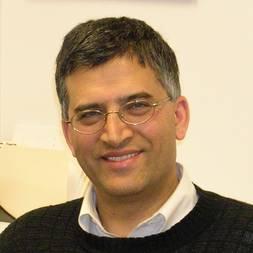Professor Vijay Kuchroo to be honored for unraveling the immune mechanisms of Multiple Sclerosis

Credit: Brigham and Women’s Hospital
NEW YORK, April 13, 2021 — Vijay K. Kuchroo, DVM, PhD, the Samuel Wasserstrom Professor of Neurology at Harvard Medical School, has been selected as the 2021 recipient of the John Dystel Prize for Multiple Sclerosis Research.
A graduate of Veterinary Medicine from the College of Veterinary Medicine in Hisar, India, who earned a PhD in pathology at the University of Queensland in Brisbane Australia, Kuchroo is Senior Scientist at Brigham and Women’s Hospital, and Co-director of the Center for Infection and Immunity, Brigham Research Institute, Boston. He is a member of the Broad Institute, and a participant in a Klarman Cell Observatory project that focuses on T cell differentiation and is the founding director of the Evergrande Center for Immunologic Diseases at Harvard Medical School and Brigham and Women’s Hospital.
“I am thrilled to receive the Dystel prize for the work we did on multiple sclerosis,” said Kuchroo. “We generated a number of animal models for the disease and these models are used world-over in the laboratories doing MS research. I launched my career with a pilot grant from the National MS Society and I am grateful to the Society for their continued support.”
Kuchroo is an innovative scientist who has made outstanding research contributions to the understanding of the underlying mechanisms that drive multiple sclerosis (MS). He is a recognized leader in the study of the immune response that damages the brain and spinal cord in MS. His research has focused on immune “T cells,” and the genes and molecules that regulate these cells’ activity in MS.
Some of the many advances to which Kuchroo has contributed include defining the role of specific proteins in nerve-insulating myelin as targets driving the immune response and developing a mouse model showing that myelin oligodendrocyte glycoprotein triggered inflammation of the optic nerve, often the first symptom of MS. Kuchroo also identified “TIM-3,” a molecule on the surface of T cells that can distinguish inflammatory cells from T cells that can regulate inflammation, and pinpointed the whole TIM family of genes that have important roles in regulating immune responses.
In nominating Kuchroo for the Dystel Prize, Howard Weiner, MD, (Harvard Medical School), and 2007 recipient of the prize, said, “Professor Kuchroo is a pioneer in the field of T cell biology and CNS autoimmunity as it relates to MS. The immune system and autoimmunity are at the heart of MS. His work has had major impact and has opened up pathways that will lead to better treatment and ultimately a cure for MS.”
Kuchroo defined distinct steps in how T cells that drive the immune response are activated, and the specific immune messenger proteins involved, providing targets for the development of immune-modulating therapies. This was translated into studies in people with MS, under his guidance. In addition, he has advanced our understanding of the role of immune B cells in MS, identifying a molecule on them that regulates tissue inflammation. These observations are now being investigated in people with MS.
“Professor Kuchroo’s research lays the groundwork for stopping the immune response in its tracks,” said Bruce Bebo, PhD, Executive Vice President of Research for the National MS Society. “This work is crucial to advancing the most promising pathways to MS cures.”
###
Kuchroo will receive the award and deliver the Dystel Prize lecture as part of the virtual American Academy of Neurology 2021 Annual Meeting on April 17.
About the Dystel Prize
The Dystel Prize is given jointly by the National MS Society and the American Academy of Neurology. The late Society National Board member Oscar Dystel and his late wife, Marion, established the Prize in 1994 in honor of their son, John Jay Dystel, an attorney whose promising career was cut short by progressive disability from MS. (John died of complications of the disease in June 2003.) Read more about other Dystel Prize winners.
About the National Multiple Sclerosis Society
The National MS Society, founded in 1946, funds cutting-edge research, drives change through advocacy, and provides programs and services to help people affected by MS live their best lives. Connect to learn more and get involved: nationalMSsociety.org, Facebook, Twitter, Instagram, YouTube or 1-800-344-4867.
About Multiple Sclerosis
Multiple sclerosis is an unpredictable, often disabling disease of the central nervous system. There is currently no cure for MS. Symptoms vary from person to person and range from numbness and tingling, to mobility challenges, blindness and paralysis. An estimated 1 million people live with MS in the United States. Most people are diagnosed between the ages of 20 and 50, and it affects women three times more than men.
Media Contact
Daphne Mack
[email protected]




